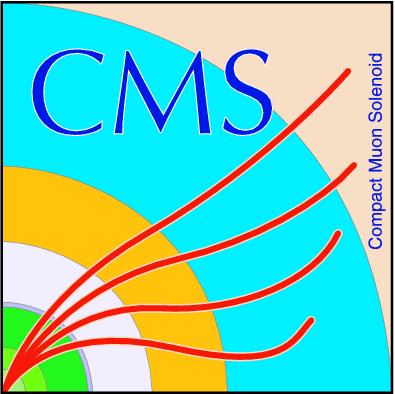
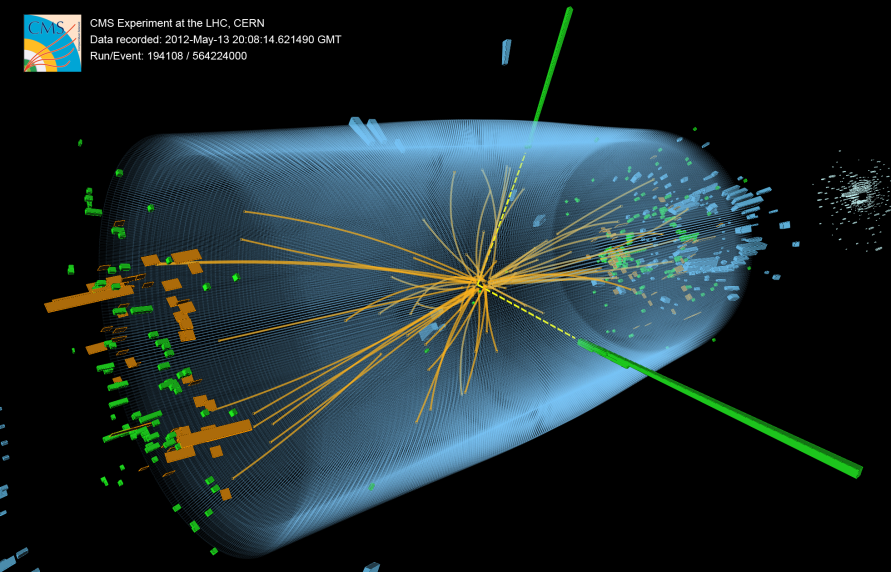
Compact Muon Solenoid
LHC, CERN
| CMS-SMP-19-002 ; CERN-EP-2021-008 | ||
| Measurement of W$\gamma$ production cross section in proton-proton collisions at $\sqrt{s} = $ 13 TeV and constraints on effective field theory coefficients | ||
| CMS Collaboration | ||
| 3 February 2021 | ||
| Phys. Rev. Lett. 126 (2021) 252002 | ||
| Abstract: A fiducial cross section for W$\gamma$ production in proton-proton collisions is measured at a center-of-mass energy of 13 TeV in 137 fb$^{-1}$ of data collected using the CMS detector at the LHC. The $\mathrm{W} \to \mathrm{e}\nu$ and $\mu\nu$ decay modes are used in a maximum-likelihood fit to the lepton-photon invariant mass distribution to extract the combined cross section. The measured cross section is compared with theoretical expectations at next-to-leading order in quantum chromodynamics. In addition, 95% confidence level intervals are reported for anomalous triple-gauge couplings within the framework of effective field theory. | ||
| Links: e-print arXiv:2102.02283 [hep-ex] (PDF) ; CDS record ; inSPIRE record ; HepData record ; CADI line (restricted) ; | ||
| Figures | |
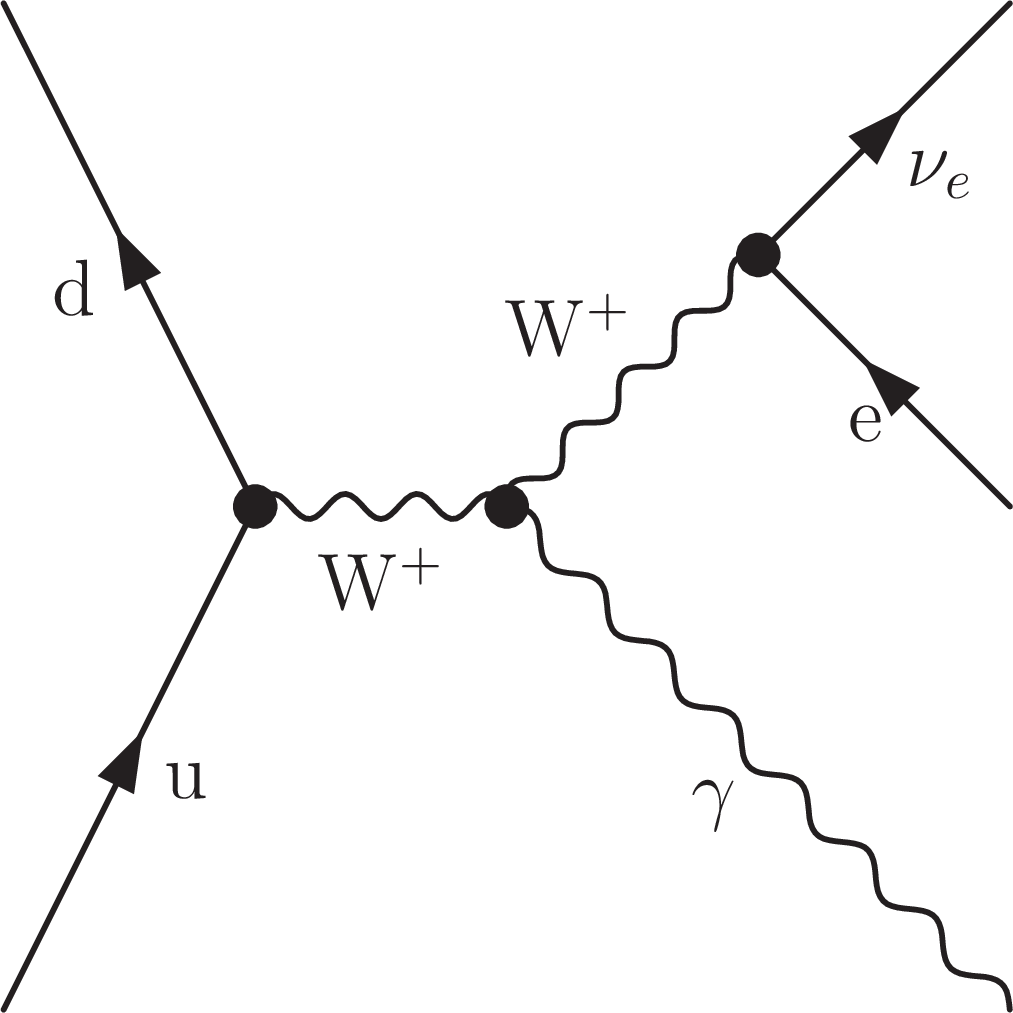
png pdf |
Figure 1:
Representative Feynman diagram for ${\mathrm{p}} {\mathrm{p}} \to \ell ^+\nu _{\ell}\gamma $ production with a TGC vertex. |
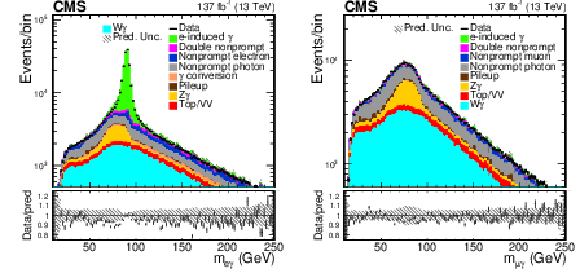
png pdf |
Figure 2:
Expected and observed distributions in the invariant mass of the lepton-photon system in the electron (left) and muon (right) channels. The signal and background processes that are drawn correspond to the estimates made before the fit, except that normalization of the electron-induced photon (one of the free parameters) is scaled by 1.8 from its pre-fit value. The uncertainty in the prediction (the hatched band) is the quadratic sum of the systematic uncertainties. The uncertainty in the data is statistical. The W$\gamma$ refers to the MadGraph 5_aMC@NLO simulation of W$\gamma$ events. |

png pdf |
Figure 2-a:
Expected and observed distributions in the invariant mass of the lepton-photon system in the electron channel. The signal and background processes that are drawn correspond to the estimates made before the fit, except that normalization of the electron-induced photon (one of the free parameters) is scaled by 1.8 from its pre-fit value. The uncertainty in the prediction (the hatched band) is the quadratic sum of the systematic uncertainties. The uncertainty in the data is statistical. The W$\gamma$ refers to the MadGraph 5_aMC@NLO simulation of W$\gamma$ events. |
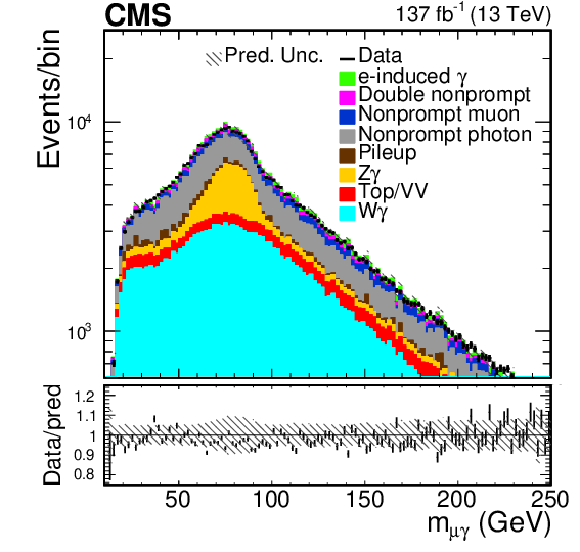
png pdf |
Figure 2-b:
Expected and observed distributions in the invariant mass of the lepton-photon system in the muon channel. The signal and background processes that are drawn correspond to the estimates made before the fit, except that normalization of the electron-induced photon (one of the free parameters) is scaled by 1.8 from its pre-fit value. The uncertainty in the prediction (the hatched band) is the quadratic sum of the systematic uncertainties. The uncertainty in the data is statistical. The W$\gamma$ refers to the MadGraph 5_aMC@NLO simulation of W$\gamma$ events. |
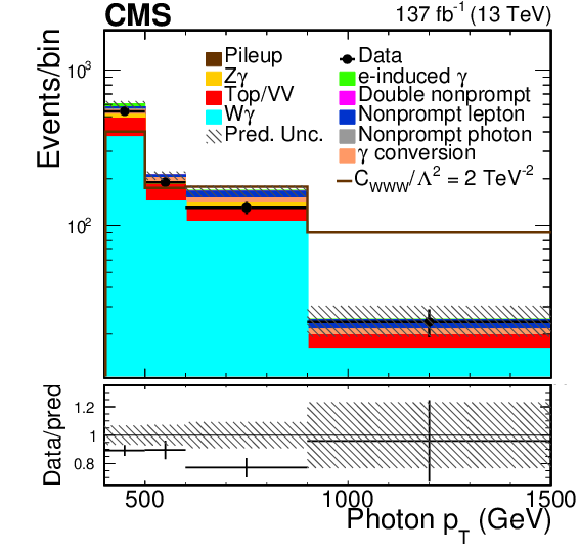
png pdf |
Figure 3:
The photon $ {p_{\mathrm {T}}} $ distribution used for the extraction of limits on dimension-six EFT operators. The expected yields correspond to the estimates made before the fit. The uncertainty in the prediction (the hatched band) is the quadratic sum of the systematic uncertainties. The uncertainty in the data is statistical. The last bin includes the overflow. |
| Tables | |
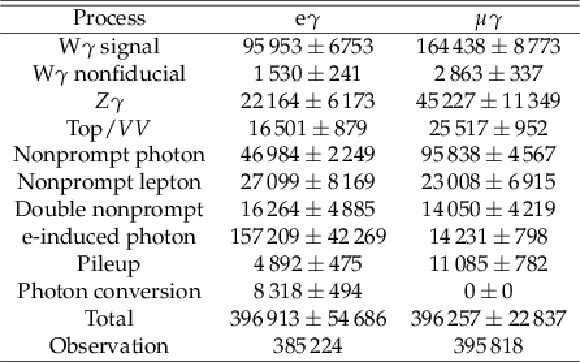
png pdf |
Table 1:
Expected and observed numbers of events. The signal and background yields correspond to the estimates made before the fit, except that normalization of the electron-induced photon yield (one of the free parameters) is scaled by 1.8 from its pre-fit value. The uncertainty is the quadratic sum of the systematic uncertainties. The W$\gamma$ refers to the MadGraph 5_aMC@NLO simulation of W$\gamma$. The W$\gamma$ signal and W$\gamma$ nonfiducial are the contributions to the signal region from the W$\gamma$ process originating from within and outside the fiducial region, respectively. |

png pdf |
Table 2:
Expected and observed 95% confidence level limits on four dimension-six operator coefficients. The units of the limits are TeV$^{-2}$. |
| Summary |
| In summary, the cross section for $\mathrm{pp} \to \mathrm{W}\gamma$ production has been measured at a center-of-mass energy of 13 TeV for the first time. The measured cross section in a defined fiducial region is $\sigma = $ 15.58 $\pm$ 0.05 (stat) $\pm$ 0.73 (syst) $\pm$ 0.15 (theo) pb $=$ 15.58 $\pm$ 0.75 pb, consistent with the MadGraph 5_aMC@NLO next-to-leading-order (NLO) quantum chromodynamics (QCD) prediction of $\sigma = $ 15.4 $\pm$ 1.2 (scale) $\pm$ 0.1 (PDF) pb, and less than the POWHEG NLO QCD with NLO competition prediction of $\sigma = $ 22.4 $\pm$ 3.2 (scale) $\pm$ 0.1 (PDF) pb. The cross sections in the electron and muon channels are consistent with each other. The high tail of the photon transverse momentum distribution is used to set 95% confidence level limits on dimension-six effective field theory parameters, including the most stringent limit to date on the coefficient of $\mathcal{O}_{WWW}$, the lowest dimension $CP$-even operator that directly alters the $\mathrm{W}\mathrm{W}\gamma$ TGC. |
| References | ||||
| 1 | Y. Cui, T. Gherghetta, and J. D. Wells | Emergent electroweak symmetry breaking with composite W, Z bosons | JHEP 11 (2009) 80 | 0907.0906 |
| 2 | C. Degrande et al. | Effective field theory: A modern approach to anomalous couplings | Annals Phys. 335 (2013) 21 | 1205.4231 |
| 3 | CMS Collaboration | Measurement of the $ \mathrm{W}\gamma $ and $ \mathrm{Z}\gamma $ inclusive cross sections in $ {\mathrm{p}}{\mathrm{p}} $ collisions at $ \sqrt{s} = $ 7 TeV and limits on anomalous triple gauge boson couplings | PRD 89 (2014) 092005 | CMS-EWK-11-009 1308.6832 |
| 4 | ATLAS Collaboration | Measurements of $ \mathrm{W}\gamma $ and $ \mathrm{Z}\gamma $ production in $ {\mathrm{p}}{\mathrm{p}} $ collisions at $ \sqrt{s} = $ 7 TeV with the ATLAS detector at the LHC | PRD 87 (2013) 112003 | 1205.2531 |
| 5 | CMS Collaboration | The CMS experiment at the CERN LHC | JINST 3 (2008) S08004 | CMS-00-001 |
| 6 | CMS Collaboration | Measurement of electroweak WZ boson production and search for new physics in WZ + two jets events in pp collisions at $ \sqrt{s} = $ 13 TeV | PLB 795 (2019) 281 | CMS-SMP-18-001 1901.04060 |
| 7 | CMS Collaboration | Electron and photon reconstruction and identification with the CMS experiment at the CERN LHC | Accepted by JINST | 2012.06888 |
| 8 | CMS Collaboration | Performance of the CMS muon detector and muon reconstruction with proton-proton collisions at $ \sqrt{s} = $ 13 TeV | JINST 13 (2018) P06015 | CMS-MUO-16-001 1804.04528 |
| 9 | CMS Collaboration | Particle-flow reconstruction and global event description with the CMS detector | JINST 12 (2017) P10003 | CMS-PRF-14-001 1706.04965 |
| 10 | CMS Collaboration | Performance of missing transverse momentum reconstruction in proton-proton collisions at $ \sqrt{s} = $ 13 TeV using the CMS detector | JINST 14 (2019) P07004 | CMS-JME-17-001 1903.06078 |
| 11 | D. Bertolini, P. Harris, M. Low, and N. Tran | Pileup per particle identification | JHEP 10 (2014) 059 | 1407.6013 |
| 12 | CMS Collaboration | Pileup mitigation at CMS in 13 TeV data | JINST 15 (2020) P09018 | CMS-JME-18-001 2003.00503 |
| 13 | J. Alwall et al. | The automated computation of tree-level and next-to-leading order differential cross sections, and their matching to parton shower simulations | JHEP 07 (2014) 079 | 1405.0301 |
| 14 | L. Barzè et al. | $ \mathrm{W}\gamma $ production in hadronic collisions using the POWHEG+MiNLO method | JHEP 12 (2014) 039 | 1408.5766 |
| 15 | A. Denner, S. Dittmaier, M. Hecht, and C. Pasold | NLO QCD and electroweak corrections to $ \mathrm{W} + \gamma $ production with leptonic $ \mathrm{W} $-boson decays | JHEP 04 (2015) 018 | 1412.7421 |
| 16 | M. Grazzini, S. Kallweit, and M. Wiesemann | Fully differential NNLO computations with MATRIX | EPJC 78 (2018) 537 | 1711.06631 |
| 17 | M. Grazzini, S. Kallweit, and D. Rathlev | $ \mathrm{W}\gamma $ and $ \mathrm{Z}\gamma $ production at the LHC in NNLO QCD | JHEP 07 (2015) 085 | 1504.01330 |
| 18 | E. Accomando, A. Denner, and S. Pozzorini | Electroweak-correction effects in gauge-boson pair production at the CERN LHC | PRD 65 (2002) 073003 | hep-ph/0110114 |
| 19 | R. Frederix and S. Frixione | Merging meets matching in MC@NLO | JHEP 12 (2012) 061 | 1209.6215 |
| 20 | P. Nason | A new method for combining NLO QCD with shower Monte Carlo algorithms | JHEP 11 (2004) 040 | hep-ph/0409146 |
| 21 | S. Frixione, P. Nason, and C. Oleari | Matching NLO QCD computations with parton shower simulations: the POWHEG method | JHEP 11 (2007) 070 | 0709.2092 |
| 22 | S. Alioli, P. Nason, C. Oleari, and E. Re | A general framework for implementing NLO calculations in shower Monte Carlo programs: the POWHEG BOX | JHEP 06 (2010) 043 | 1002.2581 |
| 23 | T. Sjostrand et al. | An introduction to PYTHIA 8.2 | CPC 191 (2015) 159 | 1410.3012 |
| 24 | GEANT4 Collaboration | GEANT4--a simulation toolkit | NIMA 506 (2003) 250 | |
| 25 | CMS Collaboration | Event generator tunes obtained from underlying event and multiparton scattering measurements | EPJC 76 (2016) 155 | CMS-GEN-14-001 1512.00815 |
| 26 | R. D. Ball et al. | Parton distributions for the LHC run II | JHEP 04 (2015) 040 | 1410.8849 |
| 27 | CMS Collaboration | Extraction and validation of a new set of CMS $ PYTHIA8 $ tunes from underlying-event measurements | EPJC 80 (2020) 4 | CMS-GEN-17-001 1903.12179 |
| 28 | NNPDF Collaboration | Parton distributions from high-precision collider data | EPJC 77 (2017) 663 | 1706.00428 |
| 29 | CMS Collaboration | Performance of the CMS Level-1 trigger in proton-proton collisions at $ \sqrt{s} = $ 13 TeV | JINST 15 (2020) P10017 | CMS-TRG-17-001 2006.10165 |
| 30 | CMS Collaboration | The CMS trigger system | JINST 12 (2017) P01020 | CMS-TRG-12-001 1609.02366 |
| 31 | CMS Collaboration | Performance of photon reconstruction and identification with the CMS detector in proton-proton collisions at $ \sqrt{s} = $ 8 TeV | JINST 10 (2015) P08010 | CMS-EGM-14-001 1502.02702 |
| 32 | CMS Collaboration | Performance of electron reconstruction and selection with the CMS detector in proton-proton collisions at $ \sqrt{s} = $ 8 TeV | JINST 10 (2015) P06005 | CMS-EGM-13-001 1502.02701 |
| 33 | T. Gleisberg et al. | Event generation with SHERPA 1.1 | JHEP 02 (2009) 007 | 0811.4622 |
| 34 | CMS Collaboration | Measurement of the cross section for electroweak production of a Z boson, a photon and two jets in proton-proton collisions at $ \sqrt{\mathrm{s}} = $ 13 TeV and constraints on anomalous quartic couplings | JHEP 06 (2020) 076 | CMS-SMP-18-007 2002.09902 |
| 35 | M. Abadi et al. | TensorFlow: Large-scale machine learning on heterogeneous systems | 2015 Software available from tensorflow.org. \url https://www.tensorflow.org/ | |
| 36 | CMS Collaboration | Measurement of the $ \mathrm{W} $ boson rapidity, helicity, and differential cross sections in $ {\mathrm{p}}{\mathrm{p}} $ collisions at $ \sqrt{s} = $ 13 TeV | PRD 102 (2020) 092012 | CMS-SMP-18-012 2008.04174 |
| 37 | J. Butterworth et al. | PDF4LHC recommendations for LHC Run II | JPG 43 (2016) 023001 | 1510.03865 |
| 38 | L. A. Harland-Lang, A. D. Martin, P. Motylinski, and R. S. Thorne | Parton distributions in the LHC era: MMHT 2014 PDFs | EPJC 75 (2015) 204 | 1412.3989 |
| 39 | S. Dulat et al. | New parton distribution functions from a global analysis of quantum chromodynamics | PRD 93 (2016) 033006 | 1506.07443 |
| 40 | O. Mattelaer | On the maximal use of Monte Carlo samples: re-weighting events at NLO accuracy | EPJC 76 (2016) 674 | 1607.00763 |
| 41 | ATLAS and CMS Collaborations, and the LHC Higgs Combination Group | Procedure for the LHC Higgs boson search combination in Summer 2011 | CMS-NOTE-2011-005 | |
| 42 | CMS Collaboration | Search for anomalous triple gauge couplings in WW and WZ production in lepton + jet events in proton-proton collisions at $ \sqrt{s} = $ 13 TeV | JHEP 12 (2019) 062 | CMS-SMP-18-008 1907.08354 |

|
Compact Muon Solenoid LHC, CERN |
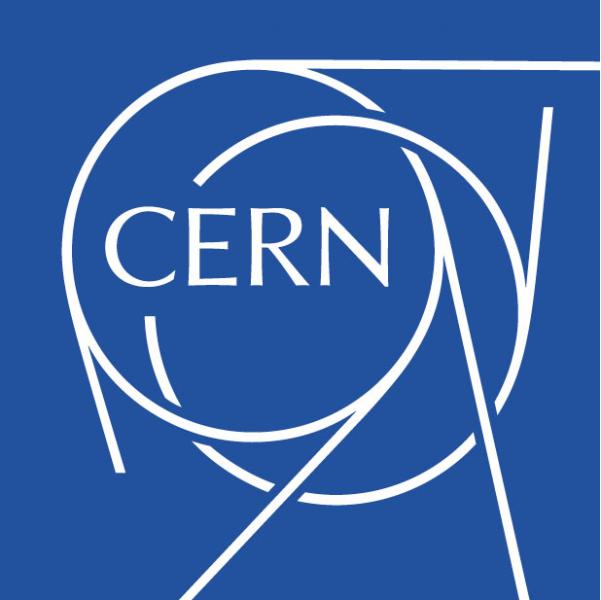
|
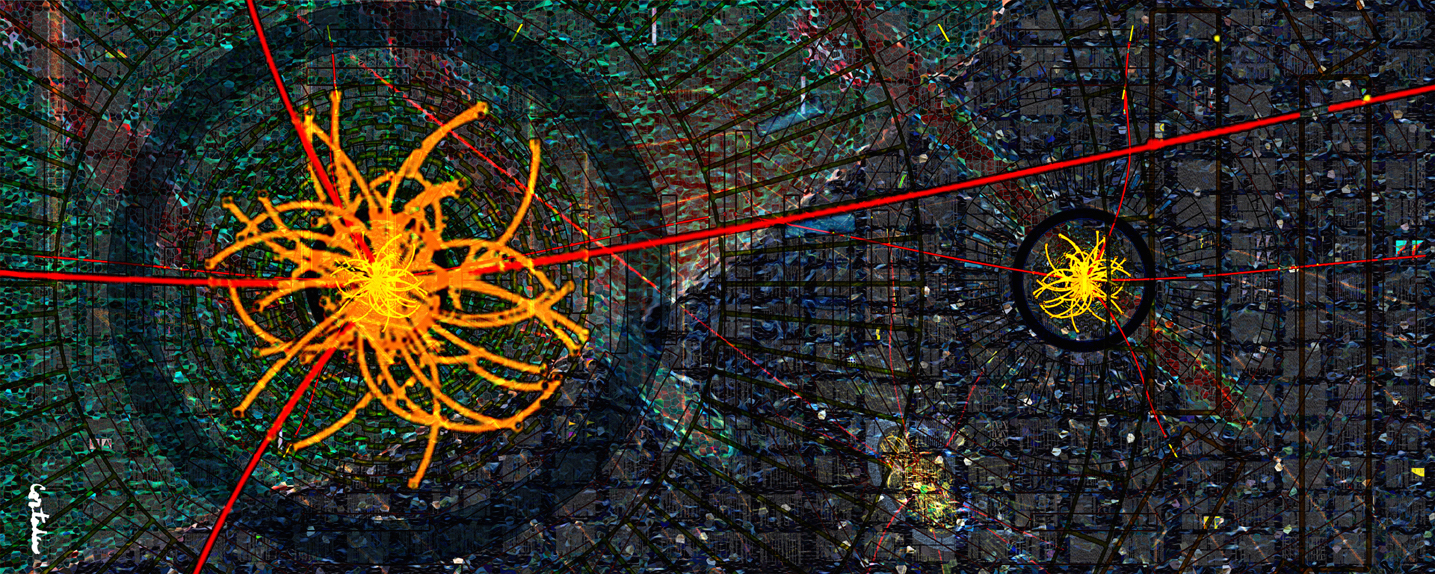
|
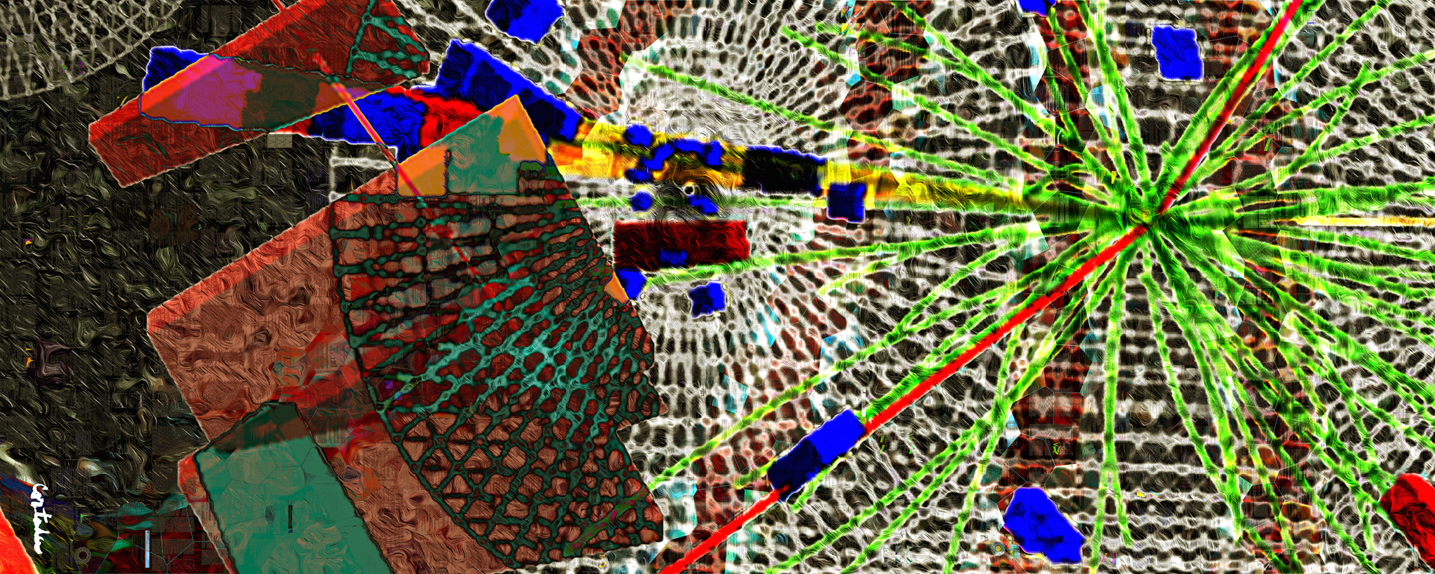
|
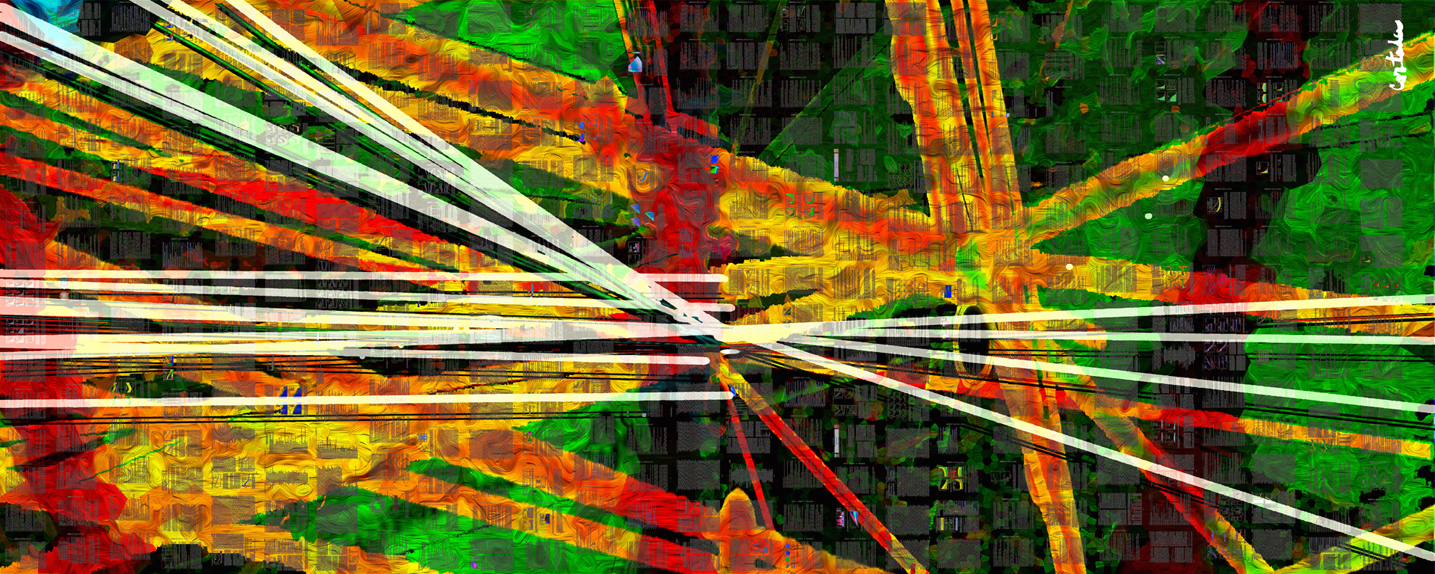
|
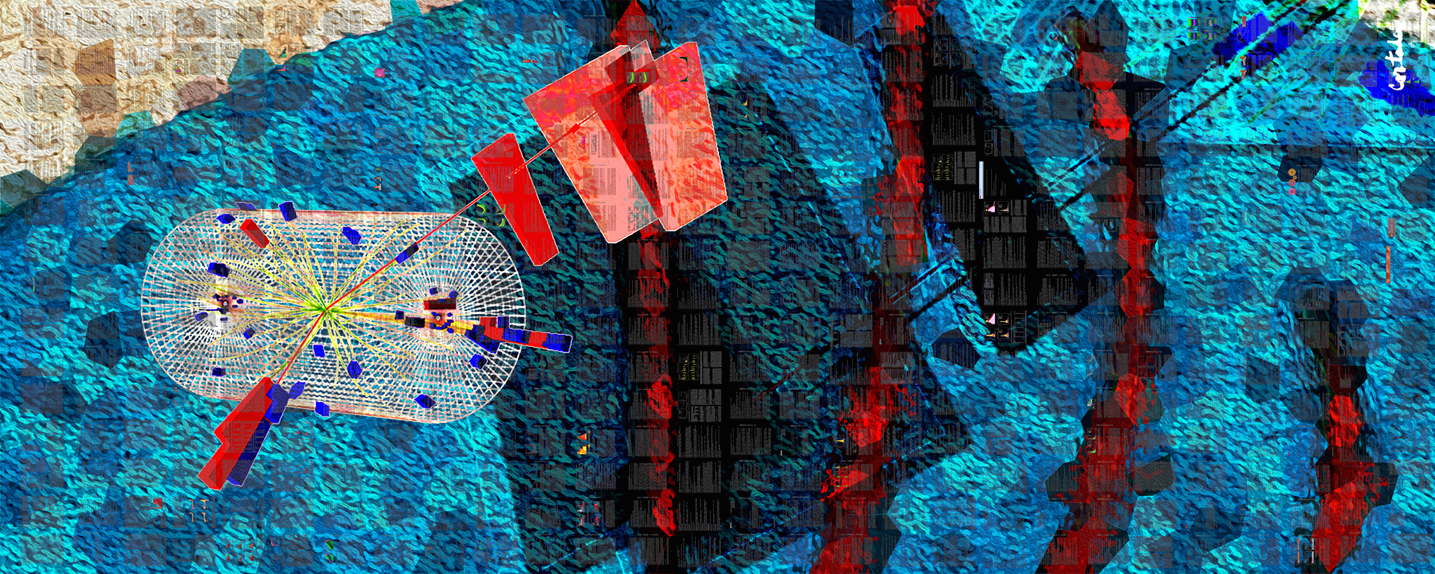
|
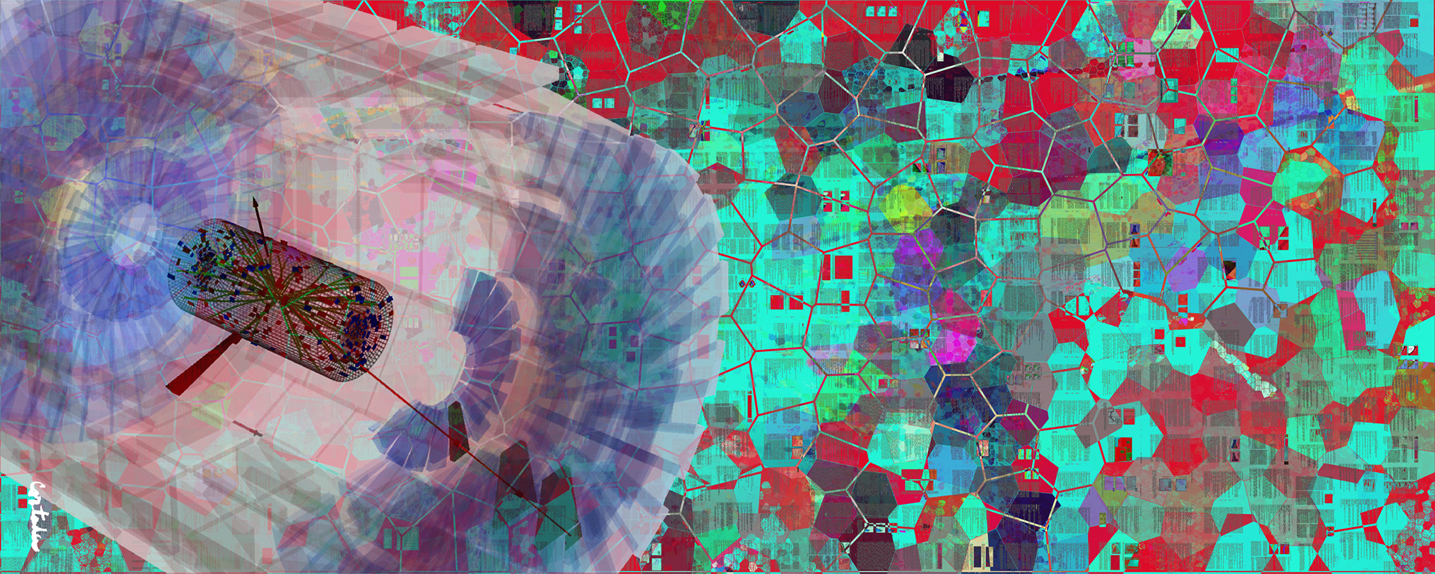
|